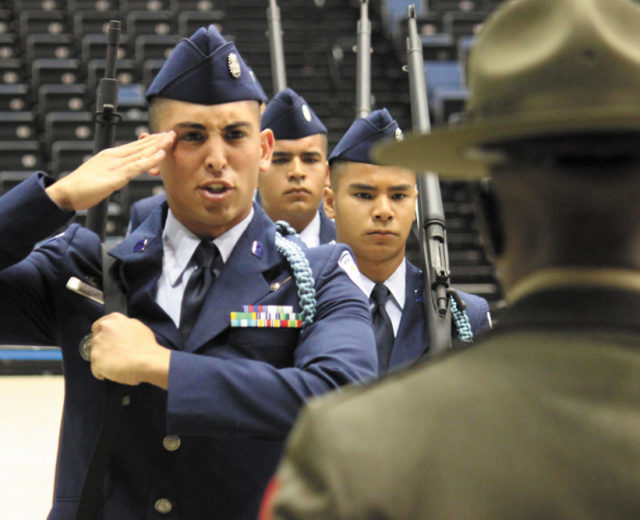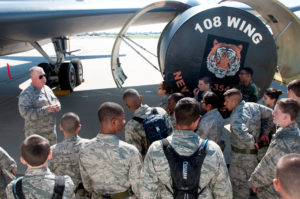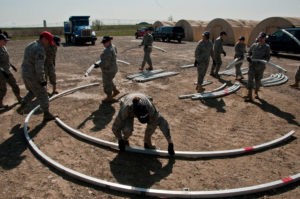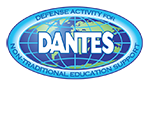February
2017
Help the Next Generation become Better American Citizens
Many military members have outstanding leadership and communication skills, adapt well to any situation, and have incredible discipline and initiative.

Many military members have outstanding leadership and communication skills, adapt well to any situation, and have incredible discipline and initiative. These are all traits and qualities many employers would be happy to have in an employee. They are also skills and traits that fit well with teachers or instructors. Military members who are transitioning or simply preparing for their next career possibilities may want to consider using their leadership and professional military skills to help mold the next generation of young adults into dedicated citizens ready to serve their nation and lead in their communities.
All of the military services, except the U.S. Coast Guard, have a Junior Reserve Officer Training Corps (JROTC) program that teaches high school students self-reliance, self-discipline and other characteristics found in good leaders. Military members with a desire to make a difference, help students realize their potential, and positively impact their communities may want to learn more about this valuable, youth-inspiring program. For the purposes of time, we’ll look more in depth at the Air Force program, but encourage members to look for similar programs in the other military services as well.
Air Force Junior Reserve Officer Training Corps (AFJROTC)
 The Air Force Junior Reserve Officer Training Corps (AFJROTC) mission is to "develop citizens of character dedicated to serving their nation and community." Program objectives are to educate and train high school cadets in citizenship and life skills; promote community service; instill a sense responsibility; develop character and self-discipline through education and instruction in air and space fundamentals and the Air Force’s core values of "integrity first, service before self, and excellence in all we do." (Source)
The Air Force Junior Reserve Officer Training Corps (AFJROTC) mission is to "develop citizens of character dedicated to serving their nation and community." Program objectives are to educate and train high school cadets in citizenship and life skills; promote community service; instill a sense responsibility; develop character and self-discipline through education and instruction in air and space fundamentals and the Air Force’s core values of "integrity first, service before self, and excellence in all we do." (Source)
The program has 878 AFJROTC units with an additional 14 National Defense Cadet Corps units for a total of 892 units operating in high schools world-wide. There are more than 121,000 high school cadets in the program. Over 1,950 retired USAF members serve as instructors and lead, mentor, guide, and teach the cadets.
AFJROTC enjoys overwhelming school administration and community support because of the huge, positive impact instructors have on cadets, schools, communities, and our nation. In communities that have no military bases within miles, the cadets and instructors are truly “the face of the U.S. Air Force” throughout the nation and the world.
Success of the AFJROTC program would not be possible without the expertise and dedication of its Aerospace Science Instructors, retired officers and enlisted personnel who have chosen to continue serving our nation and its' youth.
Instructor Qualifications
The job of an instructor is not taken lightly and requires much dedication and commitment, but these are not uncommon for those who have already served our nation selflessly.
Officer Instructors must meet the following requirements:
- retired officers who have at least a bachelor's degree
- a minimum of 20 years on active duty
More than 90 percent of them have master’s degrees with backgrounds in teaching and extensive experience working with young adults and youth groups.
Enlisted Instructors must meet the following requirements:
- retired non-commissioned officers who have at least a bachelor’s degree
- a minimum of 20 years on active duty
All enlisted instructors have extensive experience in leadership, supply, administration, drill and ceremony, teaching, and many have extensive experience working with youth groups.
Instructor Duties
 Falling back on the skills learned during their active-duty service, AFJROTC instructors are deeply involved in their communities. They teach AFJROTC aerospace science and leadership education curricula. They also serve as liaisons between the Air Force and civilian agencies in the aerospace field and perform career and performance counseling for AFJROTC cadets.
Falling back on the skills learned during their active-duty service, AFJROTC instructors are deeply involved in their communities. They teach AFJROTC aerospace science and leadership education curricula. They also serve as liaisons between the Air Force and civilian agencies in the aerospace field and perform career and performance counseling for AFJROTC cadets.
Again, similar to active-duty responsibilities, instructors help plan and support activities like drill competitions, marksmanship events, military balls, academic competitions, formal ceremonies and community service activities. They also provide in-depth instruction to their cadets on the principles of leadership and management.
Instructors devote themselves to cadets in the classroom and during extensive extra-curricular activities. Their hard work and devotion have resulted in an AFJROTC program that’s highly acclaimed at the local and national level.
Instructor Application
For military members preparing for the future and thinking about transition opportunities, becoming an instructor is an admirable second career. Members are strongly encouraged to view the qualifications to become an AFJROTC instructor.
Additional Information
For more information on the AFJROTC program, visit: www.afjrotc.com
- Army - http://www.usarmyjrotc.com/employment
- Navy - http://www.njrotc.navy.mil/instructor/instructor_index.html
- USMC - http://www.mcjrotc.marines.mil/General-Info/Job-Descriptions/
Troops to Teachers
Finally, the Troops to Teachers program (TTT) is a DoD/DANTES funded and managed program that focuses on assisting transitioning military members and veterans with meeting the requirements necessary to become K-12th grade teachers. The program also provides counseling, employment facilitation and financial support to eligible participants. Visit the TTT website for more information. This program may help you get started on the path to your next career as a teacher and/or JROTC instructor.
NOTE: Thank you to Capt. Jason M. Kitchen, USAF, Instructor Recruitment Division, HQ Air Force JROTC, for coordinating with DANTES on this blog article.

